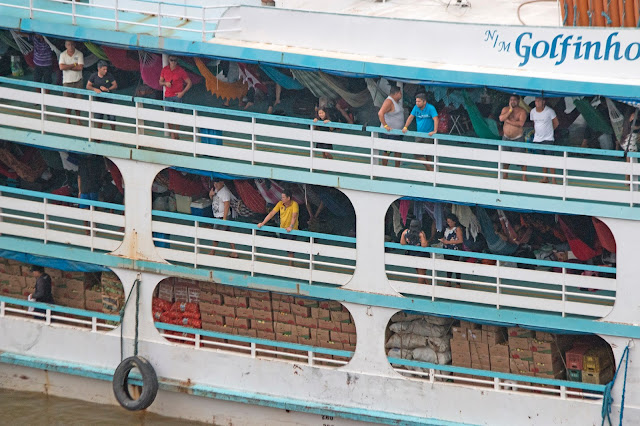Do not scroll down through this post. Yes, it is boring and maybe repetitive for some of you, but the next time you feel helpless in fixing this old planet, you now have one tool below.
My state is making an effort to improve the way we deal with waste. We are composting (turning organic material into soil conditioner instead of waste) big time! And, because you may have a busier life than I, I am going to take you on this selective tour with Master Gardeners and Master Naturalists on this cold day.
First, we got a slide show and a brief intro. This man loves his job and these "Masters" were serious enough to take notes.
This facility has a potential for 200 acres but is currently only using 40. They produce two kinds of humus. That compost which is made just from leaves, branches and grass clippings and a second process from plant material and from human food wastes. They are marketed as Leafgro and Leafgro Gold. They accept truckloads from all over the contiguous counties and charge a fee to leave waste. No plastic, ceramic, tissue, styrofoam, diapers, foil or glass is accepted, although bits and pieces do sneak in.
There are rows and rows of this compost in various stages of decomposition.
The plastic that sneaks in is filtered at the very end.
There was only the odor of freshly chopped wood and garden mulch. On warmer days the smells may be stronger. We did have to be careful where we walked as there were some pretty muddy areas.
They were moving into a more technological approach by covering the rows with a permeable long-lasting fabric and then pumping air to control temperature and oxygen levels for the breakdown.
There are environmental companies that pick up the produce and plant materials from stores and restaurants. This man below had more customers than he could handle and delivered from some of the finest restaurants in D.C. since this facility accepted raw meat! He had to pay a fee to deposit these materials but still turned a profit from the retailers' fee he collected.
This material was immediately covered by the bulldozer with several feet of plant materials and that insured that no rodents or animals came in.
And for us gardeners, we were drooling over the final product...black gold. They sold everything they produced and always had a waiting list. They sold directly as well as through over a dozen retail outlets that sold both in small bags and by the truck! There was a sliding scale and I cannot remember the price, but it was reasonable.
Now some of my readers may have no interest in this process or resulting product, but you cannot tell me you are uninterested in much smaller landfills, much less pollution, and a healthier environment! (Don't I take you to the best places?)
There are rows and rows of this compost in various stages of decomposition.
The plastic that sneaks in is filtered at the very end.
There was only the odor of freshly chopped wood and garden mulch. On warmer days the smells may be stronger. We did have to be careful where we walked as there were some pretty muddy areas.
They were moving into a more technological approach by covering the rows with a permeable long-lasting fabric and then pumping air to control temperature and oxygen levels for the breakdown.
This material was immediately covered by the bulldozer with several feet of plant materials and that insured that no rodents or animals came in.
And for us gardeners, we were drooling over the final product...black gold. They sold everything they produced and always had a waiting list. They sold directly as well as through over a dozen retail outlets that sold both in small bags and by the truck! There was a sliding scale and I cannot remember the price, but it was reasonable.





























































